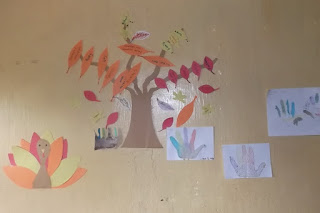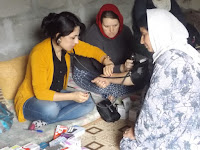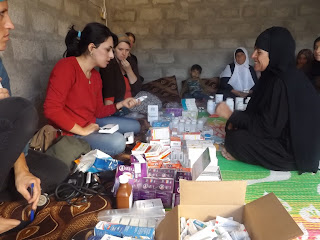Day Eight - A Picnic

We were invited for a picnic at the home of the cousins of The Refuge Initiative's Project Manager. The group photo at right is only half of the group we had lunch with. The men in this family work in an informal sector in which they take goods over the mountains and return with sale-able merchandise that is *ahem* untaxed.
After a lovely outdoor lunch in a village halfway to Turkey, we went to see the nearby mountain creek that their drinking water comes from. I am a little embarrassed at how little I knew about the varied terrain in the Middle East. This was an incredibly restful and beautiful day. In fact, I owe an apology to my boss at Lahash, because I'm always skeptical about taking time away from work and relationship to go hiking. On this afternoon I felt my spirit renewed for another week of engagement with the refugees. After returning to the house, we heard the wholly miraculous testimony of a Kurdish believer who now lives in Beaverton, Oregon. His story renewed my faith that God can redeem the worst of men or women (no offense to Sami).

Day Nine - Equal Parts Work and Play

The most distinctly different thing between the Middle East and anywhere else I've ever traveled is that Sunday is a very standard weekday. We went to a couple of camps in the morning, where I was shown the traditional method for making bread. The bread is a cross between naan and chapati. This woman kneading bread is the person I learned so much from, although we shared no language in common. She answered so many questions (through translators) over the course of my visits to their camps, and even when there was no translator, she was so welcoming and comfortable just hanging out in silence. At dusk we went up one of the mountains in a gondola for Indian and Italian food at a ski resort. (I didn't mention it, but on our first day of work we went to a resort with a roller coaster which shot over the edge of the mountain at one point--totally exhilarating!) After dinner a couple who are connected to the staff of The Refuge Initiative came over to probe my knowledge of maternal health by asking for help on getting pregnant and preventing miscarriage. I gave them all the advice I could (the vast, vast majority of it was extremely practical and not at all medical) and referred them to Dr. Niyan who could refer them to a good OB/GYN. One of my team members, an actual medical professional, and I had the privilege of laying hands and praying for the mother-to-be.
Day Ten - Politics and Perspective
In the morning we visited the mayor of Soran, who has been incredibly kind and helpful to The Refuge Initiative. (They've solved some not-inconsiderable problems for him as well.) A large part of Kurdish culture is militaristic, due to the long, long history of being targeted for destruction by their neighbors. There is a Kurdish saying that "The mountains are our only friends" because of the many times they have been able to defend themselves against incredible odds due to the rugged terrain. Nearly every young man (and many young women) volunteer for the peshmerga, a term you may have heard in connection to ISIS, since the peshmerga are the only military which have had success battling ISIS on the ground (and just recaptured Sinjar town from ISIS).
That afternoon some friends of our Kurdish friends came over with their 3-week-old baby who had been crying to the extent that the parents were getting very overwhelmed. The nurse and I took a look at the baby, who is a healthy and beautiful little girl, and advised the mother on feeding and using simethicone drops. I also showed her the things that had worked for my kids: abdominal massage and "cycling" her legs to help release the gas trapped in her gut. Pretty pragmatic stuff, but it felt good to help a fellow mother.
In the evening we got to have a time of worship with the other Western Christians living in Soran. It was such a blessing to me, since that kind of community is one of the things I really miss here in Shirati. The stories I heard that evening so inspired me. I felt as though I were sitting in the room with the kind of missionaries I used to read about. I can't say more than that, but it really puts the complaints of American Christians "oppressed" for their faith in perspective.
Days Eleven, Twelve and Thirteen - Maternal Health
At long last I got to tap into my new speciality: maternal health. Dr. Niyan joined me again to translate the teaching. She did an excellent job with a difficult task, since she was translating medical and anatomical terminology from English (her 3rd+ language) into Arabic or the Kurdish dialect spoken by the Yezidis. We taught the women basic reproductive anatomy, the processes of healthy reproduction, some of the most common things that can go wrong and why medical care is important, and finally, we did a simulated "emergency" delivery outside a medical facility. I had brought hygienic birth kit materials for each camp, thanks to the really kind donors who sponsored my trip, so at each camp the women nominated one older woman to be the keeper of the plastic sheet, gloves, gauze, umbilical clamps and sterile razor blades.

The forty-ish women who sat through our four seminars were so attentive and asked great questions, even about contraception. Part of the great thing, though, is that there are so few opportunities given to women in these conservative cultures to learn new things, and they were so grateful. I am so grateful for my dear friend, Dr. Reta Graham, who taught me nearly everything I passed along to those women. Without Mama Maisha, I would have had so little to offer them, but because of this path that God has been leading me down these past few years, I had the opportunity to minister to so many women from Muslim and Yezidi backgrounds.
After the teaching, Dr. Niyan translated about an hour of questions I had for the women about their former life on Sinjar Mountain and how they had escaped ISIS. I heard a great story about the cousin of one woman present who had been captured by ISIS and bussed to Mosul with the hundreds of women who have been sold as domestic and sex slaves. This cousin and her sister were sent to a home where they were put to work. One evening they actually escaped the house and encountered a taxi driver who agreed to help them. He knew that he couldn't take them outside the city because the ISIS checkpoints were everywhere, but picnicking in the countryside is a very popular Kurdish pastime. The driver took the young women to his home, dressed them like local Muslim girls, and packed up his whole family for a picnic in the country. Once they got outside the city, the driver just drove and drove until they encountered the peshmerga, who took the girls and got them to safety. (God bless that taxi driver who risked so much to help them!) Over the few weeks they were at that home, they were never sexually assaulted. The women telling me the story speculated that this was because the battles for Mosul and the surrounding area were still going on, so the men of that home were more concerned with fighting than with raping two young women. I appreciated hearing this dramatic story with a great ending, since the vast majority of Yezidi women who are captured by ISIS suffer much worse fates.

The day after I left Kurdistan, I got notification on Facebook that the woman we I mentioned in a prior post had given birth at home in the camp, just two days after Dr. Niyan and I had been there to give education and supplies! The beautiful little boy is healthy, as is the mother. Thank God for bringing the blessing of life!
I'm home now, and processing so many, many, many thoughts, especially about refugees and how to respond to the attacks on Paris and the refusal of many American governors to accept Syrian refugees in their states. I wish you all could meet the hundreds of refugees, male and female, young and old and very young and very old, who are in need of safety, security and support. Kurdistan is helping so many refugees that the region is literally going bankrupt, but many of my countrymen and women are refusing or protesting these beautiful families whose "crimes" are being born into an ethnic or religious group of which ISIS does not approve.
I keep thinking: If I were a young child who had been forced from my home by a violent hyper-religious military force and lived in an under-resourced, insecure refugee camp for more than two years (the amount of time it takes to be screened for placement in America), then my family was brought to the United States for safety, refuge, freedom, education, medical care and food, among many other things...well, radicalism of any kind would probably be the last thing I would want to be a part of.
On the other hand, if I had gone through all those things and kept being rejected by these rich Western countries because my ethnicity and religion were not acceptable to them either...well, my perspective on the West and Christianity might be very different.
Please consider supporting
The Refuge Initiative, the section of World Orphans that is caring for the refugees we met these past two weeks. They are doing some of the best, most sustainable and cost-effective development work I've ever seen. They need your help to provide more holistic services to the families, so please go sponsor a family or contribute to the construction of secure, cinder-block homes to transition refugees out of tents.
Finally, thank you, especially to all of you who were praying for us and who supported me financially. This trip was so powerful, and I'm incredibly grateful.
 This year we have an American guest staying with us. Megan Jackson is a Lahash Servant Team member who is staying on in Tanzania for another couple of months, and is taking a three week break here with our family. She helped the kids put together a gratitude tree and some hand turkeys. When I asked Wesley what he is grateful for, his first answer was "Letter W" followed by "Numbers." I asked him what Gretchen is thankful for, and he replied, among other things, "Fish and small fish." (Small fish are tiny silver fish we call dagaa. It's a common food here which Gretchen really enjoys.)
This year we have an American guest staying with us. Megan Jackson is a Lahash Servant Team member who is staying on in Tanzania for another couple of months, and is taking a three week break here with our family. She helped the kids put together a gratitude tree and some hand turkeys. When I asked Wesley what he is grateful for, his first answer was "Letter W" followed by "Numbers." I asked him what Gretchen is thankful for, and he replied, among other things, "Fish and small fish." (Small fish are tiny silver fish we call dagaa. It's a common food here which Gretchen really enjoys.) All day long I cooked, and Megan helped. Thanksgiving, my favorite holiday, is probably the day I feel most American out of the whole year, and it was nice to share with a fellow countrywoman. After dinner, Innocent and Megan and I played Ruckus and SkipBo. It was a pretty wonderful day, and a wonderful Thanksgiving!
All day long I cooked, and Megan helped. Thanksgiving, my favorite holiday, is probably the day I feel most American out of the whole year, and it was nice to share with a fellow countrywoman. After dinner, Innocent and Megan and I played Ruckus and SkipBo. It was a pretty wonderful day, and a wonderful Thanksgiving!























